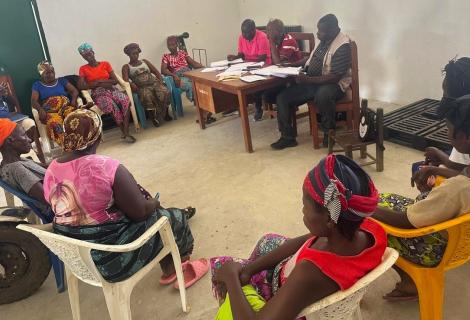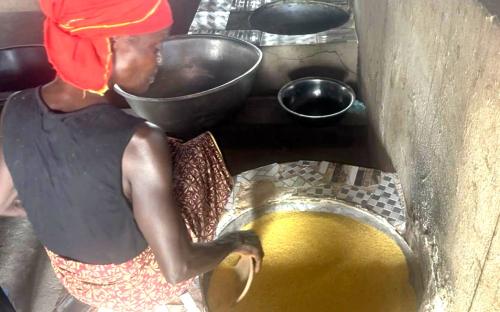United Community Agriculture Cooperative Society Takes Key Lead in Cassava Cuttings Supply Across Wee District, Calls for SADFONS support to Scale Processing

Wee District, Grand Bassa County- the United Community Agriculture Cooperative Society (UCACS) has become the singular most important supplier of improved cassava cuttings in Wee District, following a major production breakthrough made possible through the Smallholder Agriculture Development for food and Nutrition Security (SADFONS) project.
The cooperative lead farmer, Victor Kpehdyu during GAFSP assessment visit, led by ActionAid Liberia’s team, said the cooperative’s cassava outputs have expanded dramatically from harvesting as low as 25 to 50 bags of cassava harvest to now processing more than 300 bags per harvest from their 3-hectares of farm.
“I am an out-grower from SADFONs, and the cuttings we produce are even given to farmers all around here.” Victor Kpehdyu said.
“Before SADFON came, we were having low production, but since SADFONS came in, we have been able to know the size of cassava farm we now make, and we have been able to cultivate 3 hectares of land processing 300 bags of cassava and we supply farmers with cuttings” Victor told the impact review team.
UCACS members proudly reported that no other group in the district supplies more improved cuttings at the scale they now do. The cooperative has become a dependable seed-cutting bank ensuring farmers across Wee District no longer struggle to access quality planting cassava materials.
With SADFONS’ Intervention, UCACS also received a large warehouse, solving over a decade of storage challenges the cooperative members and other farmers nearby experienced.
“We used to struggle with storage for the past 11 to 15 years, but since SADFONS came and built this storage facility with shelves for us, we now have some relief when it comes to storing raw and harvested and processed cassava.”
Beyond supplying cuttings, UCACS has grown into a major producer of gari and fufu, supplying customers from Monrovia, parts of Grand Bassa, Margibi and the surrounding towns and villages.
Despite these gains and transformative journey of the cooperative, has got something big at hand to handle. It’s the challenge to meet the demands of the gari customers. The demand for their processed gari products has now exceeded their capacity.

It takes so many efforts according to Mercy Digges and other women of the cooperative to parch several bags of grinder cassava into gari using hands.
“The fire work is very hard. Parching the gari with our hands, it makes us not to be able to fix enough gari, and sometimes when the buyers send their money it can take us 2 weeks for us to finish parching 5-10 bags of gari.” Mercy explained.
Mercy and others are sending out heart-warming plead to SADFONS to assist the cooperative with two pieces of equipment, the cassava parching machine and a cassava packaging machine.
They say when this is done, it will help them in meeting the rising consumers' demand, reduce physical labor and allow them to process their cassava in line with modern standards. Although the group under SADFONS was enlisted as a cassava cuttings multiplier, but the say they don’t want to be only limited to producing cuttings, but delve into value added.
“SADFONS been helping us, but we want them to continue working with us. Let them please help us with the cassava parching machine.” Mercy concluded.
Many families from the cooperative rely on the incomes they generate from the cassava cultivation and from the gari and fufu they produce from their harvested cassava. Out of the income, they save some into their saving group financial clubs, pay for their children’s education, medical and support other pressing needs.
The group made a scores of recommendations to the SADFONS management team. Key among those, they are appealing for the awarding of farmers loans. They say with the loan, they can expand their farms, pay for daily labor, because according to them, for the clearing of the farm, they often get local laborers whom they pay LD$500 for a day of work.
Liberia is one of six countries being assessed under the Global Agriculture and Food Security Program (GAFSP) review, alongside Tanzania, Cambodia, Loas, Haiti, Burundi, and the Democratic Republic.
The assessment focuses on documenting progress, challenges, and opportunities for strengthening food security, climate resilience, nutrition, gender inclusion, and income generation in farming communities under the SADFONS project.
For the United Community Agriculture Cooperative Society, the verdict is clear, SADFONS has transformed their production capacity and position them as the leading cassava cuttings supplier in Wee District. But scaling up requires machinery that matches with cooperative’s new level of growth.